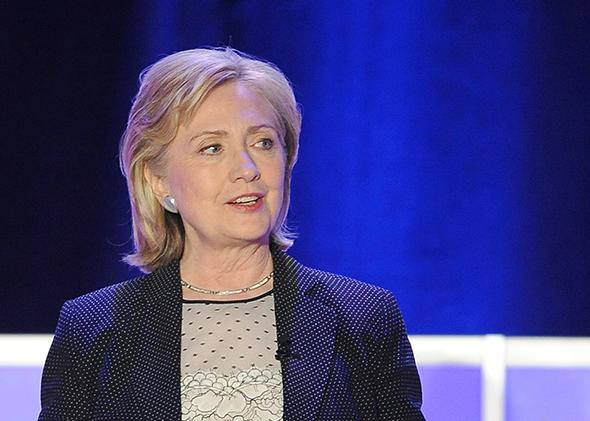The Hillary Clinton of 2007 was a popular presidential front-runner who fell on the wrong side of the Democratic base with her vote to authorize the Iraq war, which opened the door to a successful challenge from then-Sen. Barack Obama.
The Hillary Clinton of 2014 is a much more popular figure and far more dominant candidate. She outpaces every potential competitor, with supermajority support among Democratic voters, and a ready network of operatives, donors, and organizations. We still don’t know how she’d run a second presidential campaign—would she repeat the strategic blunders of 2008?—but on the surface, she’s far stronger than she was.
She even has an answer to the Iraq question, seven years after it ruined her first run for the presidency. In her memoir/campaign book Hard Choices, she writes that she “got it wrong. Plain and simple.” And in an interview with the Canadian Broadcasting Corp. promoting the book, she said that she would “absolutely not” send ground troops to fight extremist forces in Iraq and “would not support any effort by the United States to back up” the current government “unless the conditions that we had been asking for for a number of years had finally been met.”
But a pat answer isn’t the same as understanding, and looking at her time in the Obama administration, it’s clear Clinton hasn’t actually learned anything important from her Iraq war vote, other than I shouldn’t support wars in Iraq. Indeed, when it comes to other interventions in other countries, Clinton is as hawkish as she ever was.
In every internal administration debate during her four years as secretary of state, Clinton backed the most aggressive approach. She supported the surge in Afghanistan, pressed for the raid that killed Osama Bin Laden, and supported the intervention in Libya. She was an early advocate for arming the rebels in Syria, and in her book, she defends drone warfare as “one of the most effective and controversial elements of the Obama Administration’s strategy against al Qaeda and like-minded terrorists.”
This logic even extends to Iraq. Yes, she says her vote was a mistake, but at the State Department she was aggressive in pushing for a long-term troop presence in the country. Here’s more from the Daily Beast:
“Hillary Clinton was a lion for keeping troops there,” James Jeffrey, who was the U.S. ambassador to Iraq in 2011, told The Daily Beast in an interview. “She was a strong advocate for keeping troops there past 2011,” when American forces eventually withdrew.
Right now, the “problems” with Hillary Clinton are all about image and rhetoric. For example, she’s done a bad job talking about her wealth, and some Democrats don’t think she can relate to ordinary people. “When you’re somebody like the secretary of state or president of the United States or first lady, you’re totally cut off [from normal activity], so your perception of the middle-class reality gets frozen in a time warp,” said one Obama adviser in an interview with the Washington Post, who advised Democrats to “panic” over the issue.
But this is nonsense. Americans have never had trouble electing rich people to the presidency, to say nothing of bona fide aristocrats like Franklin Roosevelt and John Kennedy. Even Aloof Rich Man™ Mitt Romney would have won had he run in a slightly worse economy against a slightly less popular president. In other words, nothing Clinton says now will matter for the presidential election. Clinton could be a gaffe machine from now until November 2016, and if she’s running in a good economy, she stands an even chance of winning.
Clinton can survive her clumsy language. What could pose a problem—and more importantly, what has posed a problem—is her unapologetic hawkishness, which is completely out of step with the Democratic Party and liberals in particular. In 2011, while Clinton pushed an intervention in Libya, Democrats agreed—57 percent to 33 percent—that the United States had no responsibility to do something about the fighting there. Likewise, in a September 2013 survey from the Pew Research Center, 53 percent of Democrats, 56 percent of liberal Democrats, and 63 percent of liberals opposed airstrikes in Syria. And last week, House Democrats—reflecting their constituents—voted overwhelmingly to end any combat funding for Iraq.
Given her huge popularity with Democratic voters and elites, it’s hard to imagine a world where Clinton loses the nomination to anyone but a strong, well-funded challenger who also makes inroads with the black community (a necessary step to winning a Democratic primary). So far, that person doesn’t exist. But if he did, Clinton’s hawkishness could return as an unanticipated weak spot for her campaign.
With all of that said, it’s far too early to predict what this might mean for the presidential election. But we can say a few things about Clinton, and if you’re an intervention skeptic, none of them is good. Judging from her rhetoric and her actions, nothing about the wars in Iraq and Afghanistan has changed her views on foreign policy. She’s done the minimum and disavowed the debacle in Iraq, but she hasn’t learned from it, and if elected president, she stands poised to make the same mistakes that led us to that disaster in the first place.
